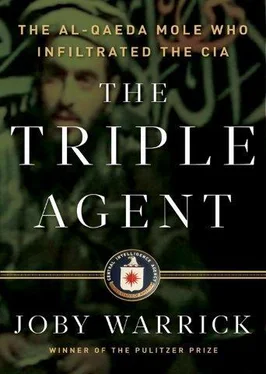Abu Dujana had been thrust into a small elite of jihadist writers and pundits with large online audiences and global reach. Yet no one knew who he really was. The speculation among his most ardent online followers was that he was a Saudi and very likely a senior official within al-Qaeda. But in fact even the al-Hesbah managers who gave Abu Dujana the moderator’s job did not know his true name or nationality. Nor did the Mukhabarat or the CIA, which employs teams of specialists to monitor jihadist Web sites full-time and write reports deciphering and analyzing their content. Balawi’s father and brothers joked about his love affair with his computer, but even they knew nothing about the secret life he created on the flickering blue screen.
The transformation would occur at home, usually at night or on weekends, when he was free from his duties at the clinic. Balawi would hunch over his small desktop computer for hour after hour until his eyes reddened and his wife, Defne, began to worry. Already Balawi had a reputation for being a recluse, rarely going out or socializing with friends or even attending Friday prayers at the local mosque. Balawi would deflect Defne’s questions by insisting that he had to study, but when she came into the room, the books would be tossed to the side and her husband would be where he always was, perched on his favorite chair with eyes locked on the computer screen. The more Abu Dujana grew, the smaller Balawi and his old life became.
“He was preoccupied,” Defne said later. “He was living in fantasy in another world.”
Balawi had written online columns under several other fake names before Abu Dujana al-Khorasani made his first appearance in 2007, just as Balawi was hitting his stride as an essayist. The pseudonym itself was a mash-up of historical names instantly recognizable to devout Muslims; Al-Khorasani means “from Khorasan,” the ancient name for the vast swath of Muslim lands stretching from the old Persian empire to the Hindu Kush mountains, encompassing much of modern-day Afghanistan. Abu Dujana was a seventh-century Arab warrior who was a favorite of the Prophet Muhammad’s. A skilled swordsman who relished the mayhem of hand-to-hand combat, he was also arrogant and showy. Before battle he would don a red headband and taunt his enemies by strutting mockingly in front of their lines.
Abu Dujana the pundit was a showman as well, prone to verbal bluster and fireworks. His first articles quickly cemented his reputation as one of the most engaging and colorful writers in the online community of radical Islam. He raged against all the usual targets—Israel, the West, and U.S.-friendly Arab governments—but his writings also reflected an understanding of Western culture and a knack for appealing to younger Muslims who grew up with instant messaging and social networks. In one passage he would excoriate ordinary Muslims as being unthinking clones, “like Dolly, the cloned sheep,” and in another he would write wistfully about a future in which even the Barbie doll “will wear the veil and recite the Koran when you touch it.”
He would also entice his audience with images of battlefield carnage, fresh from amateur jihadi photographers in Tikrit or Ramadi, served up with a gleefully ghoulish commentary that became Abu Dujana’s trademark.
“Welcome to the al-Hesbah café,” he wrote to open one Internet session. “Go to the menu and pick today’s dish:
“Roasted Humvee with sauce of human remains.
“Exploded tank by an IED [improvised explosive device] with no survivors.
“Or a pastry made of Americans’ brains taken out with snipers’ bullets.”
Thousands of Muslims sampled Abu Dujana’s offerings and paused to read his words. And each week the appetite for his articles grew larger still. Abu Dujana—whoever he was, wherever he was—was becoming a true celebrity.
He had to be stopped.
Inside the headquarters of the secretive National Security Agency in suburban Washington is a computer search engine unlike any other in the world. Code-named Turbulence, it is a five-hundred-million-dollar-a-year network that continuously vacuums up terabytes of data from across the Internet and scours them for possible security threats. When specific targets are identified—a new Web site or an unknown militant group, for instance—it can burrow into a single computer on the other side of the world to steal files or drop off eavesdropping software. Agents on the ground can then follow up with portable surveillance gear so sensitive it can detect individual strokes on a computer keyboard from hundreds of feet away.
The precise methods used for tracking a specific target overseas are a closely guarded secret. But what is known is that sometime in late 2008, such tools were used to hunt down a popular jihadist blogger who called himself Abu Dujana al-Khorasani. Working backward through a maze of servers and trunk lines spanning continents, U.S. officials narrowed the search to Jordan, then to Amman, and finally to a single house in a working-class neighborhood called Jabal Nuzha.
The man’s true identity came as a shock, most especially to Jordan’s Mukhabarat intelligence service: One of radical Islam’s rising stars was an obscure pediatrician living right under its noses.
What happened next was up to the Mukhabarat. While the CIA and its foreign counterparts closely monitor jihadist Web sites and occasionally shut them down, more often they prefer to quietly study them for insights into how terrorist movements are evolving. The Mukhabarat would have to decide if the man who called Muslims to holy war as the fictitious Abu Dujana posed a flesh-and-blood threat to Jordan and beyond. Someone would have to go to school on Humam Khalil al-Balawi, and that person ultimately turned out to be a midlevel officer who understood the phenomenon of Internet jihad as well as anyone in the agency’s counterterrorism division. His name was Ali bin Zeid, but he was known among his peers as Sharif Ali, an honorific that denoted noble birth. Bin Zeid was a direct descendant of Jordan’s first monarch, Abdullah I, and a cousin to the king.
Just thirty-four, bin Zeid was already a ten-year veteran of the intelligence service, with a number of medals and commendations to his credit, including one from the CIA. Sensitive to perceptions that his royal blood accorded him privileges, he worked long hours and never mentioned his ties to the crown unless there was something to be gained for his entire unit. Once, during a training exercise in the desert, he pulled rank to arrange for a special lunch delivery to his campsite: Big Macs and fries for everyone in his company. But he was also serious and intense. His weapon of choice was a fat .44 Magnum pistol known as a Desert Eagle, which he hoped would even the odds in case he encountered a would-be assassin looking to make his mark by killing a son of the monarchy.
The stocky, thick-chested bin Zeid was also more Western than most of his colleagues, having attended college in Boston and worked as an intern for Massachusetts’ junior U.S. senator, Democrat John Kerry. He spoke immaculate East Coast–accented English, and he was tight with his American counterparts in the CIA’s station in Amman, particularly a former Army Ranger named Darren LaBonte. The two men were frequently partners when the two agencies worked together on terrorism cases, and they had traveled the world together, from Eastern Europe to the Far East. Both newlyweds with young wives, they sometimes spent lazy weekends in a foursome on the Red Sea near Aqaba in bin Zeid’s boat.
Bin Zeid and LaBonte would brainstorm about difficult cases, and few were more perplexing than that of the mysterious doctor the Jordanian was assigned to watch. The Mukhabarat had gathered reams of material on Balawi and had trailed him for weeks on his excruciatingly dull ten-mile trek from central Amman to the United Nations’ Center for Motherhood and Children, where he worked in the Marka refugee camp. Bin Zeid read the files and daily reports and pondered them, set them aside, then read them again.
Читать дальше












